So, you’re thinking about the pros and cons of a GPS tracker for guitar, but you’re not sure what it’s all about or if it’s worth the trouble to protect your precious instrument from theft. In this article, I’ll reveal everything you need to know about how to use GPS technology to track your guitar, should the unthinkable happen!
I’ll also show you some of the other tracking methods that can be used to locate your guitar. Keep reading to learn more!
You can use the table of contents below to take you to the area that interests you. Click on the little box to open it, and then click on the section of the article you want to read, or you can read from start to finish if you want the full GPS for guitar experience!
The Short Answer
A GPS tracking system can access the satellite Global Positioning System to find your guitar’s location. If you have an expensive guitar, I recommend you invest in a quality GPS tracking system, especially if you gig professionally. The best place to hide a GPS transmitter is in the guitar case or vibrato bridge cavity if one is available. A GPS tracker works better than microchips, RFID tags, Bluetooth trackers, and online registries.
Keep On Reading (Below) To Learn More
Pros And Cons Of Guitar Recovery Systems


Here is a summary of the major advantages and disadvantages of the various recovery systems players use to help keep their guitar safe.
You can click on each recovery system to learn more!
| Recovery System | Pros | Cons |
|---|---|---|
| GPS Tracking | Best tracking technology | Can be expensive |
| Microchips | Small and easy to hide | Not popular with police & pawn shops |
| RFID Tags | Adjustable beacon rate | Limited tracking distance |
| Bluetooth Trackers | “Lost and found” network | Very limited tracking distance |
| Online Registry | Keeps identifying info together | Cannot track your guitar |
Keep On Reading (Below) To Learn More About Each Topic
What Is A GPS Tracker

A GPS tracker accesses the satellite Global Positioning System (GPS) to find and transmit the coordinates of a geographic location. This allows the user to electronically view the whereabouts of the tracking transmitter on a map by using software that talks to the GPS satellites.
Before the technology was available for commercial use, the military first implemented GPS tracking systems.
Today they are used in devices like smartphones and automobile navigation systems. A GPS tracker can be used to find the location of anything, including pets, valuables like jewelry, and musical equipment.
How A GPS Tracker Works
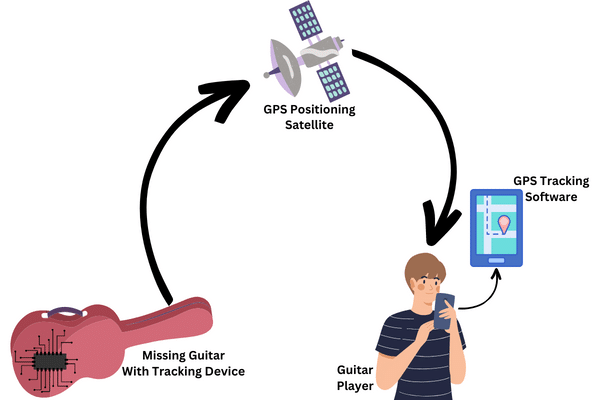
Referring to the illustration above, let’s say someone grabbed your guitar when you weren’t looking, and you had a GPS transmitter hidden in the case. You can access the transmitter device on your smartphone to retrieve your instrument!
The transmitter communicates with a group (three to four) of global positioning satellites to locate the guitar and then transmits the coordinates to software on your smartphone (or laptop, etc.). The software shows you the whereabouts of the instrument on a map.
GPS transmitters utilize a SIM (subscriber identification module) card, which makes this the best technology currently available to locate your guitar if it is stolen. The main drawback s that special scanning or locating equipment is required to access the device.
How Much Does A GPS Tracker Cost Per Month?
That depends on the quality and capability of the tracking system your purchase. The cost of the transmitter device can vary from about $15 to thousands of dollars, depending on the use.
Things that affect cost include tracking distance and transmitter device power source (standard vs. rechargeable battery). In addition to purchasing the transmitter device, there may be a setup fee, but some companies may waive the monthly charges.
Systems are available that can allow you to track a guitar’s location online in real time, but they can be costly.
For example, EasyTracGPS (https://easytracgps.com/other-assets-equipment/guitar-gps-tracking/) makes a rechargeable GPS tracker that is ideal for guitars and other instruments.
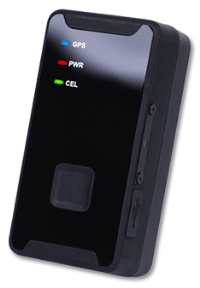
Their Geo-TraxMICRO tracker sells for $170 with a $15/month subscription plan for 60-second tracking updates. It can transmit tracking data in over 200 countries!
Is There A Free GPS Tracker?
Unfortunately, you’ll have to buy the GPS transmitter device that you’ll hide in your guitar case or guitar. You’ll also need a GPS tracking contract, which may come with a free activation fee.
Additionally, many GPS trackers require a monthly subscription fee. Some companies offer no monthly payments, but the transmitter device they sell is typically more expensive, and other yearly fees may be included.
Where Is The Best Place To Put A GPS Tracker?
GPS tracking devices can be small enough to hide inside a guitar case or in places like a guitar’s tremolo cavity, if one is available, using heavy-duty velcro. Hiding a tracker under the pickguard in a routed cavity is not a good idea since the battery will typically last about 2 to 3 weeks, and rechargeable batteries need to be accessed much sooner.
If you are thinking of modifying your guitar to install a tracker, please be sure that you have the tools and training necessary to do a proper job, or you could permanently damage your instrument! Please take a look at the section below for more info.
Are GPS Trackers Worth It?
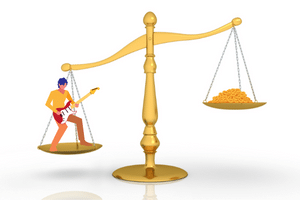
It all depends on your particular situation and what you’re trying to protect.
For example, if you are a beginning player with a guitar worth less than $100, you may not want to pay a recurrent fee that will eventually exceed the price of your initial investment. You should consider some of the other types of location technology that I have listed below.
Suppose you have a more expensive guitar but you don’t typically take it out of your home. A godd home alarm system might be the way to go.
If you do invest in a GPS tracking system for your guitar, make sure you get one that will meet your needs. You don’t want to have a false sense of security, especially if your own a valuable guitar!
Other Types Of Location Technology
Here are some other options that don’t use GPS tracking, which are available to help identify the owner of a guitar or even find its location.
Microchips
A microchip can be installed in the guitar and then scanned to reveal the true owner’s name and address. Gibson has installed microchips in some of its custom shop guitars, but it is not a commonly done practice.
Microchips are popular for use with dogs and cats, but this concept never really took off for musical instruments. One reason is that police and pawn shops stopped using microchip technology in favor of other theft recovery modalities, such as online registries.
An RFID guitar microchip marketed as “SNAGG” is no longer available.
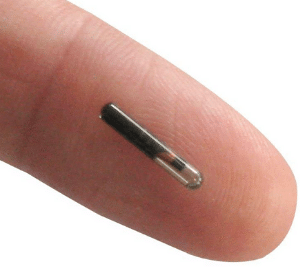
RFID Tags
RFID (Radio Frequency ID) tags can be small, especially the passive type, making them easy to hide. They operate using ultra-high frequency (UHF) radio waves.
Passive RFID Tags
Passive RFID tags don’t require their own power source and can be very thin, which makes them ideal for slipping under your guitar’s pickguard. They work well in an inventory situation but are not suitable theft trackers since they only have a range of about 12 meters (about 40 feet).
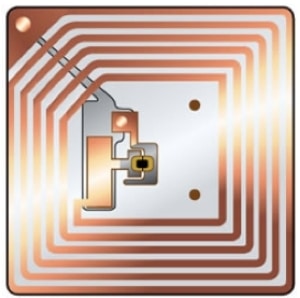
Active RFID Tags
Active RFID tags are battery-powered devices that act as radio frequency beacons. They can have tracking distances of 100 meters or more (about 300 to 350 feet). So they could be useful if your guitar was just stolen, like if it was taken off-stage but is still somewhere in the building.
The tag’s beacon rate can be adjusted to suit the situation. The higher the beacon rate, the more accurate the location will be, but the shorter the battery life. For example, a 5-minute beacon rate will probably give you a 1-to-2-year battery life.
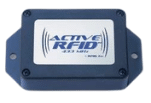
Bluetooth Trackers
Bluetooth is short-range UHF wireless technology. It is typically limited to a transmission range of 30 to 45 feet (60 feet max), but “Tile” makes a tracker that can be hidden inside your guitar case or electric guitar, which might help you locate it.
Tile Bluetooth Trackers
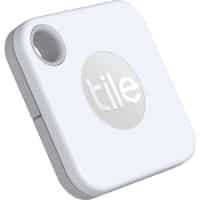
TiIe Bluetooth trackers (https://www.thetileapp.com/en-us/) are battery-powered units that are smaller than most GPS transmitters. Their “Pro” version can communicate with your smartphone from up to 400 feet away, so what makes them more useful than active RFID tags?
Tile trackers can help find your guitar using their “lost and found” network. If someone else who uses the Tile tracking system app is in proximity to your guitar, it will send the location info to your phone, regardless of how far away you are.
For example, if your guitar is at the train station or airport and another Tile tracker user walks by within range, you will get the guitar’s location on your smartphone.
This seems like a “long shot,” but Tile claims that their lost and found network finds 6 million things every day in 230 countries and territories and that 90% of tiles marked lost are eventually found.
They have a Premium Protect Plan at about $8/month that will reimburse you up to $1000 per item if they can’t find it, which could be ideal if you are going on vacation or a business trip with an expensive guitar.
Subscribing To An Online Registry

List your guitar and other equipment with an online registry, which allows you to keep all your info in one place. You can quickly access it to give to the police and your insurance company if your guitar gets stolen.
When you create a registry account, you can add photos, serial numbers, receipts, and other specific identifying info. The police and second-hand buyers and sellers like pawnshops can have direct access to the database, which gives them a way to contact you directly.
Before signing up with a registry, check to be sure that it will not disclose the precise location of your instrument other than by city or town, publish any of your private info, or sell your data to third parties.
Here are two online registries that have proven helpful in retrieving stolen property.
PlayChecked (.com)
PlayChecked (https://www.playchecked.com/) is a free registry service specifically designed for musical instruments. If your guitar is stolen, you can alert the local community and receive an email from anyone with useful suggestions or information regarding the instrument’s potential whereabouts.
Immobilize (.net)
You can also register your guitar on the free national registry website “immobilize” (https://www.immobilize.net/), a US database for any item. It also has a UK-specific branch (https://www.immobilise.com/).
When To Buy Guitar Insurance

If you have a valuable new or vintage guitar, it’s good to have a GPS tracking system and a home alarm, but these things may not provide adequate protection.
Professional players that take their expensive instruments on the road and high-end guitar collectors often buy theft insurance. Several excellent insurance companies specialize in guitars and related equipment. For example, Heritage Insurance Services (https://musicins.com/) is a popular choice.
Remember, guitars passed down through family generations may be worth quite a bit of money.
If you’re unsure what your guitar is worth, it’s a good idea to have it evaluated by a professional appraiser.
Are You Qualified To Make Guitar Adjustments Or Modifications?
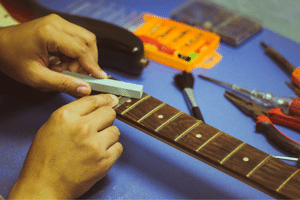
It’s great to work on your guitars, especially if you have a lot of them, but you should always be aware of your limitations.
Adjusting things like an electric guitar’s string height (action) or pickup height can be straightforward. Still, some adjustments require the proper training and experience, like adjusting a guitar’s truss rod.
Routing or drilling a cavity in your guitar body to install a transmitter device may not be the best idea, especially if you don’t have the proper tools.
When you doubt your ability to adjust, repair, or modify your guitar, it’s always best to bring it to a competent guitar technician or luthier (guitar designer & builder). You can permanently damage your guitar, and it might never play and sound right again!
Making modifications to your guitar can void its manufacturer’s warranty and cause permanent damage to the instrument. Certain modifications are irreversible, so you may be stuck with them, even if you desperately want to restore the guitar to its original condition!
I learned that the hard way over the years until I did a three-year apprenticeship in a guitar repair shop. Now I have my own home workshop with the proper training and equipment to safely maintain and repair all my instruments.
Remember: “When In Doubt, Send It Out!”
Frequently Asked Questions

Here are some of the questions I get asked about GPS tracking.
If your question does not appear here, please put it in the comments, and I will get right back to you with an answer.
Can GPS Tracking Be Wrong?
It’s unlikely that you will receive the wrong location, but you could lose the GPS signal. The GPS satellite signal strength can depend on several factors, including satellite configuration, atmospheric conditions, signal blockage, and the quality and design of your GPS transmitter and receiver.
Military GPS is more accurate than the commercial version, but you shouldn’t have a problem locating your lost guitar if you have a good GPS tracking system.
What Blocks A Tracking Signal?
Things like tall buildings with a high metallic density and wet trees can block the tracking signal from a GPS satellite array. Avoid putting your transmitter device in aluminum foil, a metal box, or a plastic container.
How Much Data Does A GPS Tracker Use Per Month?
That will depend on the GPS company you’re signed up with and how the tracking is being used. For example, some motor vehicle navigation setups can require at least 1 GB of data per month for downloading maps. On the other hand, much less data is required to locate a guitar (typically 1 to 10 MB per month), so it should not be an issue.
Can GPS Work Without A Battery?
Yes, in some instances, you can have a plug-in or hard-wired GPS tracker. However, a GPS tracker installed in a guitar case or a guitar requires a battery for a wireless connection. Wireless GPS trackers are available with standard or rechargeable batteries.
Does GPS Tracking Work On Cell Phones?
Yes, GPS transmitters send signals directly to a GPS satellite array, which sends the location coordinates to a receiver that has compatible tracking software. The receiver can be a cellular device like a smartphone, but a cell phone is not required to receive the signal. You can use receiver software on an Internet device like a tablet, laptop, or desktop computer.
How Does GPS Tracking Work Without The Internet?
GPS transmitters send signals directly to a GPS satellite array, which sends the location coordinates to a receiver that has compatible tracking software. The receiver can be any device that can receive a compatible radio signal from the GPS satellites, so an Internet connection is not required.
Final Thoughts

I hope you found this GPS Tracker For Guitar article helpful! Now you have a basic understanding of how it all works and what your options are.
The cost of a GPS tracking system depends on the service as well as the design and quality of the transmitting device. There can be a startup fee, but some companies may waive the monthly charges.
There really isn’t a reliable way to get into free GPS tracking technology. Even if you find a service that won’t charge you service fees, you still have to buy their transmitter device.
There are several places to install the GPS transmitter device, like hidden in the guitar case or inside the guitar. If one is available, I prefer installing it inside the vibrato bridge cavity using heavy-duty velcro. Remember, you need to have easy access to the transmitter to replace the battery or recharge it.
If you want to avoid the expense of GPS tracking, there are other types of location technology, such as microchips, RFID tags, Bluetooth trackers, and online registries.
Players with an expensive guitar should have a GPS tracking system and consider buying guitar insurance.

Related Article ➡ How To Protect Your Guitar From Theft – Best Tips And Tricks
Here’s a video from AirBolt that offers a GPS tracker with a twelve-month rechargeable battery. Check it out!
Tell Me What You Think
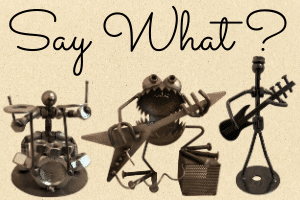
Please leave a comment below if you enjoyed this article, have any questions about GPS trackers, or want to give your point of view. I will be happy to help you.
- Do you use location technology to protect your guitar? What type?
- After reading this article, are thinking of buying a GPS tracker? Which one?
- Do you have your guitar(s) insured? Who do you recommend?
- What else is on your mind?

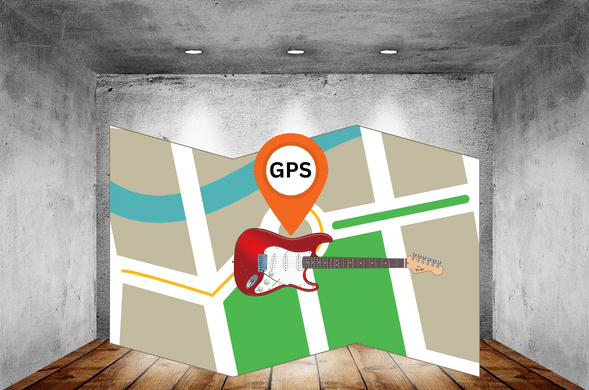

I have benefitted from tracking my phone with the aid of GPS. But I did not know it will work with my guitar. Although it sounds a little expensive with the monthly subscription, but the advantage outweighs the cost. Uop of it is the accuracy of the GPS trackers. It was precise when I lost my iPhone. And I believe a similar thing will work with the guitar
Hi, Owoeye
Thank You for your comments!
Yes, I have used GPS tracking for guitars, and it works great under most conditions.
However, it is on the expensive side, but it’s a good investment for the equipment you really need to protect!
Frank 🎸
Wow, this is the first time I’ve heard of using the GPS technology for guitars. Having lost a guitar once, I can see how it’s useful despite the fact that the one I lost wasn’t expensive, so wasn’t worth the tracking. However I can. really understand for those who have more costly ones or valuable vintage guitars that this makes total sense. You opened my mind to this area of protecting our valuable assets. Thanks for writing this.
Hi, HT
Thank You for your comments!
GPS tracking is definitely worth the investment for guitars that have a high monetary or sentimental value!
Check it out and let me know what you think. If you have any questions, I’ll be happy to help you. 😎
Frank 🎸
Oh, hello there, fellow guitar enthusiasts! I just stumbled upon this article about GPS trackers for guitars, and let me tell you, I had no idea this was even a thing. But now that I know, I am absolutely intrigued.
As someone who has had a guitar stolen before (yes, it was tragic), I can definitely see the appeal of having a little tracker on my instrument. I mean, let’s be real, guitars are expensive and sentimental, and losing one is like losing a piece of your soul.
But seriously, I appreciate the author for bringing this topic to my attention. I never would have thought to look into something like this on my own, but now I’m definitely considering it.
Have any of you fellow guitar players out there ever used a GPS tracker on your guitar? If so, how did it work out for you? Did it give you peace of mind or was it more of a hassle than it was worth?
Anyway, thank you to the author for shedding some light on this interesting topic. And to all my fellow guitarists out there, keep shredding and may your instruments never fall into the wrong hands. Cheers!
Hi, Bob
Thank You for your comments!
I had an Ibanez guitar stolen offstage several years ago, and it is heartbreaking.
If you want to track your equipment, a GPS tracker is the best way to go! A few of my more expensive guitars have them installed. Fingers crossed! 😎
Rock On! 🤘
Frank 🎸